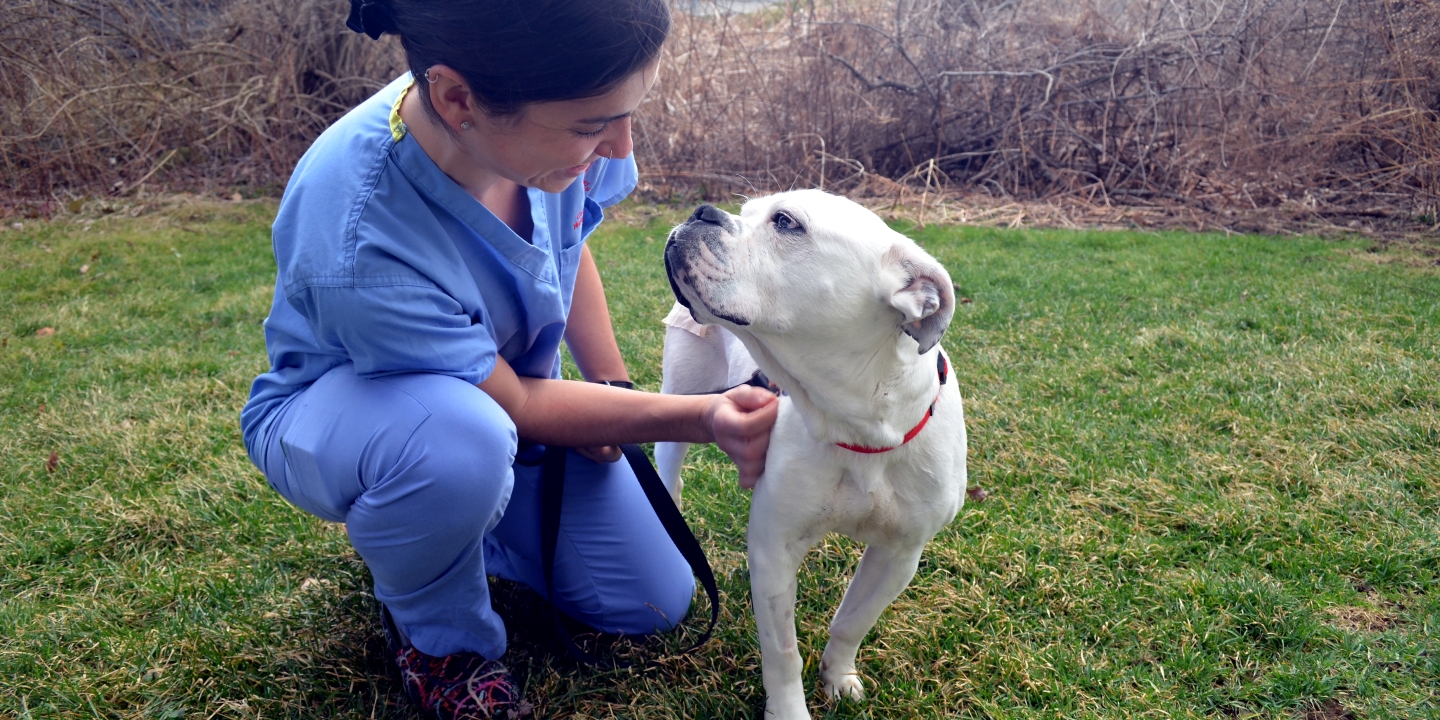About
The Cornell Richard P. Riney Canine Health Center is dedicated to improving the lives of dogs, helping them lead longer, healthier and happier lives. We do this through research, outreach and engagement.
Research
Cornell has a long history of game-changing contributions in canine health. From vaccine development, to genomic research addressing diseases such as blindness, to exploring the continuum of basic foundational research through to clinical application, all under one roof. For example, more than half of the vaccines routinely administered by veterinarians for dogs were developed at Cornell. Over the years, these discoveries have saved the lives of millions of our canine companions.
We continue to build on that foundation of addressing diseases in dogs, as we develop new breakthroughs that will improve canine health.
Engagement
We seek to engage with dog owners and enthusiasts by making researchers more accessible, research more relatable and more actionable. We will work with you to identify ways that you can be involved from participating in clinical trials to citizen scientist initiatives.
Outreach
Through our efforts, the Riney Canine Health Center will be the most-trusted and frequently consulted resource for high quality, up-to-date information regarding canine health in the world.
History
The Cornell Richard P. Riney Canine Health Center grew out of a shared goal among faculty, staff and donors of the College of Veterinary Medicine — including those at the Baker Institute for Animal Health, formerly known as the Cornell Research Institute for the Diseases of Dogs — to support research to advance canine health. The guidance provided by the college and Baker Institute Advisory Councils, along with a gift in 2020 from founding donors, Don and Rita Powell, helped build momentum for the development of a canine health center at Cornell.
Through the visionary support from the Riney Family Foundation in 2021, the Cornell Richard P. Riney Canine Health Center will dramatically accelerate the college’s efforts to help canine health research become more relatable, researchers more accessible, and canine health information and programming more responsive to the needs of dogs and those who care for them.
Canine health has been the focus of research at the College of Veterinary Medicine for decades, and the list of accomplishments that have improved the lives and well-being of dogs is extensive. The Cornell Richard P. Riney Canine Health Center will build on these achievements by supporting scientific discovery that enables our canine companions to live longer, healthier, happier lives.
Meet our team
The Riney Canine Health Center is a network of faculty and staff within the Cornell University College of Veterinary Medicine working together to promote the health of dogs around the world. The center is supported by a team of over 50 researchers, joined across six academic departments, the Baker Institute for Animal Health, two large veterinary medical centers and the Animal Health Diagnostic Center.
We are also excited to leverage the center to build interdisciplinary connections with other colleges across the Cornell campus, Weill Cornell Medicine and Cornell Tech to create truly innovative solutions.
Faculty
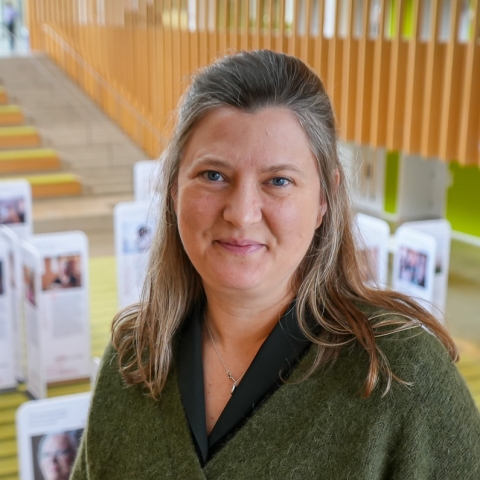
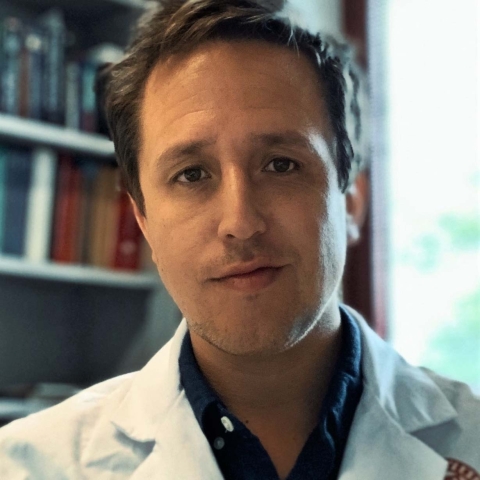
I am a scientist and clinician with board-specialization in anesthesiology and a Ph.D. in medical sciences. I work mainly in the area of respiratory physiology, with a focus on mechanical ventilation during health and pathology. I am currently focused in the use of different imaging methods to evaluate the lung function of different animals (including dogs) subjected to mechanical ventilation. We use techniques such as biomechanical analyses from CT scans and functional electric impedance tomography, together with advanced respiratory mechanics.


I am an Associate Research Professor at Cornell University College of Veterinary Medicine. I am a Medical Physicist combining expertise in physics and medicine to help and people and animals. I have published in a variety of fields, including safety and quality improvement in human oncology, machine learning methods from medical images and medical image processing, and am currently exploring the use of AI with medical images in the veterinary setting, including detecting diseases in cats and dairy cows, and preventing injuries in Thoroughbred racehorses.

I am a senior lecturer in the Department of Clinical Sciences, Section of Anesthesia and Pain Medicine, in the Cornell University Hospital for Animals. My research interest is pain management in all species (with strong focus on dogs) — particularly severe, chronic pain and interventional pain medicine. I often collaborate with Sports Medicine/Rehab Service.
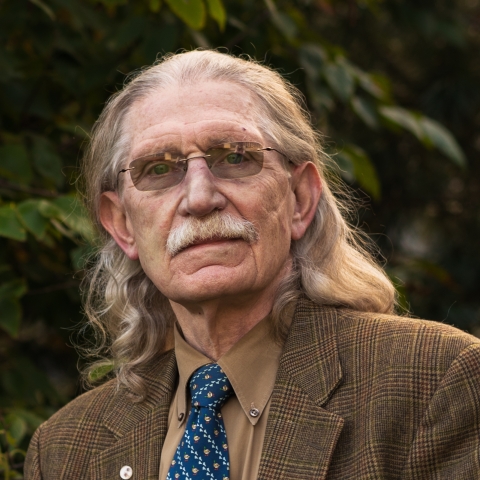

I am an Associate Professor in Biomedical Sciences at the Cornell University College of Veterinary Medicine and a member of the fields of Genetics, Genomics and Development, Biomedical & Biological Sciences, and Computational Biology. I am also co-founder and Chief Science Officer of Embark Veterinary, a dog DNA testing company founded in 2015 and incubated at the Cornell McGovern Center, as well as a trustee for the Morris Animal Foundation. My research focuses on complex trait mapping, bioinformatics, statistical genetics, inference of evolutionary forces and demographic history from genomic data, and understanding the evolutionary process of domestication and rapid adaptation.
Prior to joining the faculty at Cornell, I received undergraduate degrees in computer science and evolutionary ecology from the University of Illinois as well as a masters in Computer Science and doctorate in Biology at Purdue. I also worked as a postdoc and research associate at Cornell and Stanford studying population genomics before focusing my research on canine genomics. My family includes three kids, three ducks and a dog, Penny (http://embk.me/penny2848).
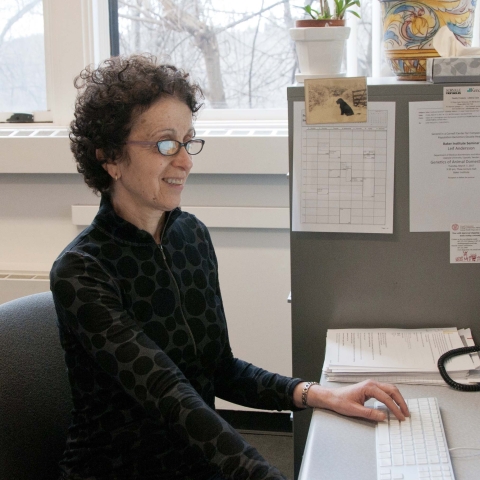
I am a veterinarian and internal medicine specialist whose career has focused on diagnosis and treatment of coagulation disorders. My laboratory is a central site for diagnosing bleeding disorders in dogs, and our research aims to gain understanding of the genetic and environmental factors that cause these diseases. In addition to disease diagnosis, our laboratory works with other veterinary researchers in multi-institution studies to design evidence-based treatment regimens for dogs receiving anticoagulant and antiplatelet drugs, and to develop new and effective blood products for transfusion and regenerative medicine.
Recent/ongoing canine projects include:
- Platelet studies- immune-mediated thrombocytopenia, comparative proteomics
- Anticoagulant therapy- pharmacokinetic/pharmacodynamic studies of new oral drugs
- Transfusion therapy- investigation of lyophilized platelet concentrates, plasma replacement for anticoagulant toxicities
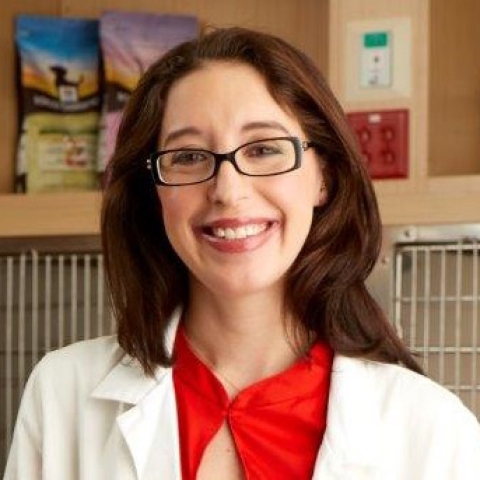
I received my DVM from Tufts University Cummings School of Veterinary Medicine. I then completed a rotating internship at Angell Animal Medical Center in Boston and a surgical internship at the Dallas Veterinary Surgery Center. I then completed a surgery residency at the Animal Medical Center in New York City. After residency, I worked in private practice for 11 years in southern California, as a staff surgeon and then the Chief of the surgery department for 6 years. I established the Minimally Invasive and Interventional Radiology department while at that practice. I then joined Cornell University in 2020 as an Associate Professor of Soft Tissue Surgery in the Department of Clinical Sciences. My previous research efforts have been focused on clinical studies over a broad subject matter including orthopedic and soft tissue diseases (biliary re-routing procedures, TPLO, vacuum assisted open abdomen techniques, leech therapy for reconstructive techniques and intestinal surgery). My current research focuses on minimally invasive surgery for animals and interventional radiologic techniques. I am a Diplomate of the American College of Veterinary Surgeons and the founder of the Association of Women Veterinary Surgeons. I have spoken at multiple national and international conferences during the past decade and have been elected to the executive board of the Veterinary Endoscopy Society.

My training is as an internal medicine specialist with a special interest in infectious disease and as an epidemiologist; most of my time is spent in the Small Animal Community Practice guiding veterinary students through primary care cases. I am originally from New Hampshire, obtained my DVM from Cornell, did an internship at the University of Pennsylvania, spent a year in general practice in Oregon, completed a residency in small animal internal medicine at Oregon State University, and obtained a PhD in epidemiology from Boston University School of Public Health while working as an internist for Tufts VETS in Massachusetts. My research focuses on exploring the evidence base behind common primary care recommendations, the effective use of diagnostic/screening tests, and training of veterinary students. I also serve as a resource for other clinician-scientists in designing and analyzing clinical studies.

My research interests are broadly in the epidemiology of zoonotic diseases, evidence-based medicine, and One-Health. Recently, I have been developing methods to improve antimicrobial resistance surveillance and track multidrug resistance.

I am a Diplomate of the American College of Veterinary Surgeons. Together with Dr. Martin- Flores, I work on the early diagnosis of laryngeal paralysis in dogs and regenerative medicine therapies to improve outcomes in these challenging cases.
We have developed a technique that allows use to test the function of the larynx under a short anesthetic and detect small early dysfunctions in the opening of the larynx. We have also developed a technique that allows us to perform an enhanced, more regenerative nerve graft to restore function to the larynx after nerve injury.

I am a Board Certified Veterinary Dermatologist® and received my DVM from Louisiana State University in 2009. I completed a small animal rotating internship at MSPCA Angell Animal Medical Center in 2010 and a residency in Veterinary Dermatology at Cornell University in 2012. I then worked in private practice at a busy multi-specialty hospital before returning to Cornell in 2019 as an Assistant Clinical Professor of Dermatology. I appreciate the relationships developed with my patients and owners during the course of managing chronic skin conditions. I have a clinical interest in otology and enjoy teaching veterinary students and training Dermatology interns and residents. My current research includes trialing novel antipruritic and antimicrobial therapies for canine patients and comparative dermatohistopathology. I am interested in researching canine epitheliotropic lymphoma in the hopes of developing better prognostic and therapeutic tools for this condition.
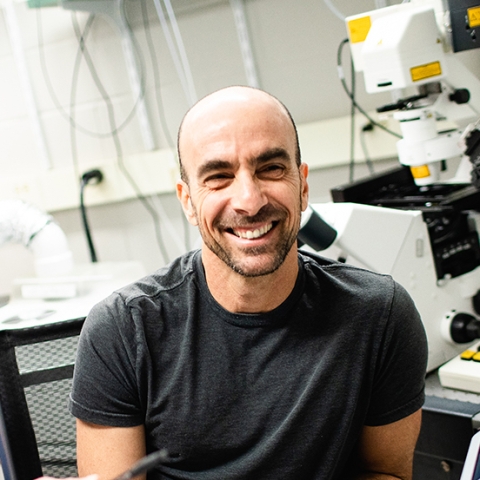

I am an Associate Professor at the Cornell University College of Veterinary Medicine, in the Department of Population Medicine and Diagnostic Sciences. I received my DVM in 1996 and Ph.D. (Epidemiology) in 2010, both from Cornell University.
My Ph.D. research focused on the epidemiology and public health implications of salmonellosis in dairy cattle. From 2011–2017, I served as an Assistant Professor at the Texas A&M University College of Veterinary Medicine & Biomedical Sciences. My primary research interest is the application of epidemiologic approaches to investigate the ecology and transmission of Salmonella and other foodborne pathogens among domestic and wildlife hosts. I also have extensive experience teaching veterinary, graduate, and undergraduate students, on topics ranging from epidemiologic methods to veterinary public health. I strive to find creative, dynamic ways to engage students as active participants in the learning process.

I am interested in how DNA — the basic blueprint for all living things — is interpreted by cells to produce living, breathing organisms. I also explore how diseases, like cancer, change these interpretations and affect the health of animals and humans.
My two research goals are the following:
- Understanding how evolution determines human and animal differences — The genes of humans, chimps, rhesus macaques, mice and rats aren’t all that different, considering how diverse these creatures are. My lab and our collaborators are studying the roles of “gene enhancers” in evolution. These are small parts of the genome that can increase or decrease the number of times that a gene is transcribed into RNA, and then ultimately translated into the proteins that make up the functional differences between the animals.
- How cancer cells use genes differently — Glioblastoma cancer cells make up many serious brain tumors. To determine how to specifically target those cancers, my team has studied the ways these cells turn their genetic instructions into action, in comparison with normal, healthy cells. We have identified several proteins called “transcription factors” that drive the out-of-control growth of cancer cells. This information can be used to design cancer therapies specific to each type of cell and its associated cancers.
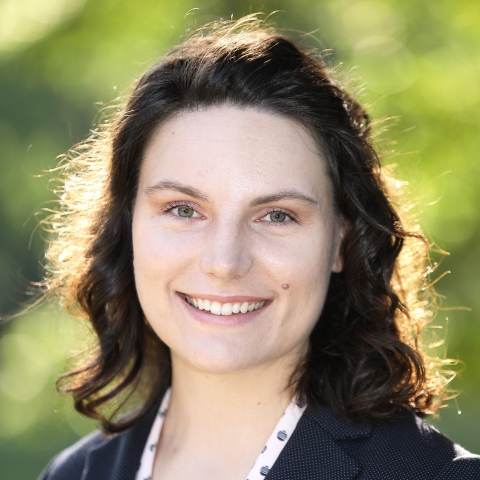
My research program focuses on improving the health of dogs by identifying genetic risk factors for disease — leading to genetic tests to reduce disease frequency, earlier disease detection and potentially improved therapies. Many canine diseases have human counterparts often caused by the same mutation or mutations in the same genes/pathways. Thus, the information we learn from the dog model may also inform human disease research.

I have worked with extracorporeal therapies (ECT) in cats and dogs for more than 10 years. I have developed programs in private practice and will be establishing the first program of this kind at Cornell. Applications include renal replacement therapy in dogs with acute kidney injury from infections or toxins; extracorporeal toxin removal using standard hemodialysis, charcoal hemoperfusion and therapeutic plasma exchange; and treatment of immune mediated conditions and sepsis with therapeutic plasma exchange. Advanced cytapheresis techniques is a potential future direction. There is a wealth of opportunity for establishing evidence-based models for these applications, while improving clinical outcomes in our canine patients.
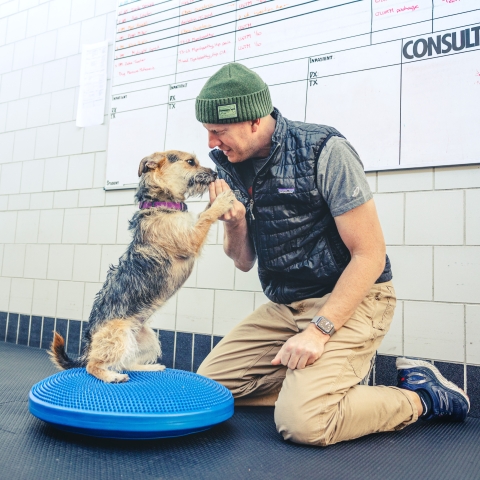

I am a 1980 graduate of the University of Georgia, College of Veterinary Medicine. I completed a rotating large animal internship and surgical residency at Cornell University. I am currently a professor of large animal surgery and a senior associate dean for academic affairs at the College of Veterinary Medicine, and I am a member of the American College of Veterinary Surgeons. My clinical expertise is in large animal soft tissue procedures.

I am the senior associate chair of the Department of Clinical Sciences, where I'm also a professor in the Section of Anesthesiology and Pain Medicine. My research focuses on respiratory physiology, as well as the development and validation of methods for how to measure fluid flow. I work with both large and small animals as an anesthesiologist, and I have helped lead collaborations between the College of Veterinary Medicine and external veterinary clinics — including the Rosamund Gifford Zoo in Syracuse, New York, and The Belize Zoo, located outside of Belize City.

I am a small animal emergency and critical care specialist. My research employs laboratory investigations and clinical trials and focuses on diagnosis and management of thrombosis, use of biomarkers for diagnosis and management of sepsis, and the treatment of canine immune-mediated hemolytic anemia.
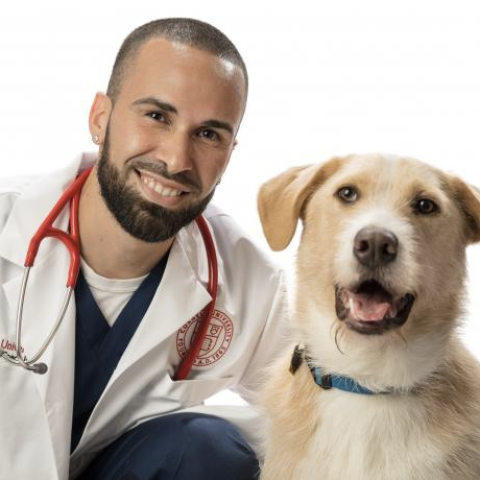
I am a graduate of Cornell University and received my Doctor of Veterinary Medicine degree from Tuskegee University. Following an internship, I completed a residency in Emergency & Critical Care at the University of Pennsylvania. I am a board-certified by the American College of Veterinary Emergency and Critical Care. I have expertise in both emergency care and in managing critical patients. My special clinical interests are focused on pulmonary medicine, inhalation therapy, and trauma. I also enjoy teaching and plays an active role in the clinical training of residents and mentoring of nurses. I believe strongly in practicing the highest level of medicine, going above and beyond for his patients. Warm approachability and authentic connections with my patients’ families ensures that these families are engaged in the care of their pets every step of the way.

The Goodman Lab leverages genomic technology to study canine infectious diseases in a One Health framework. Thematic research areas include pathogen discovery, antimicrobial resistance and tick-borne disease. We aim to fill knowledge gaps in animal health while informing public health policy.
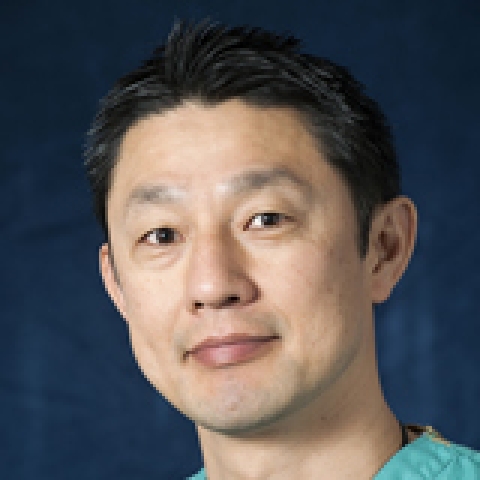
I am a canine orthopedic surgeon with advanced skills in fracture repair, joint reconstruction, and pediatric orthopedics. Special focus in pathogenesis based approach to surgical joint disease, canine sports injuries, congenital deformities in puppies, and shelter trauma cases.
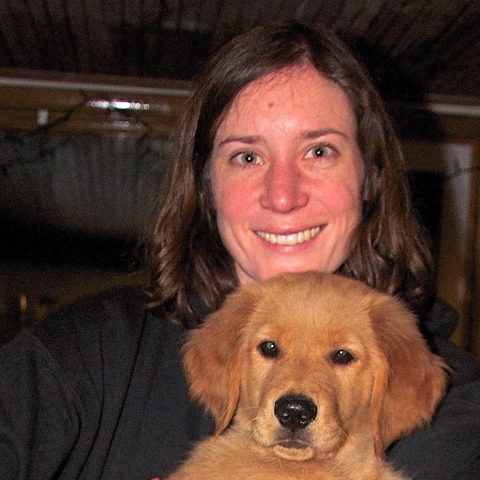
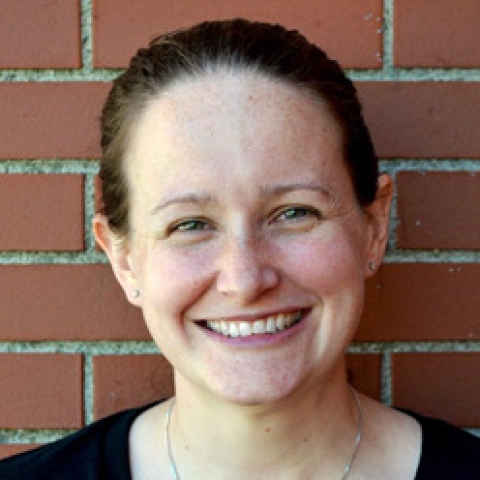
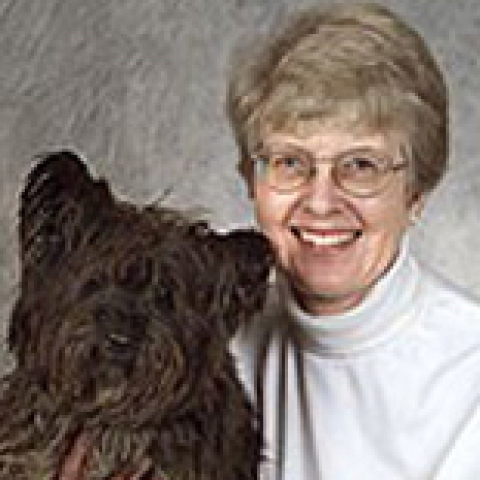
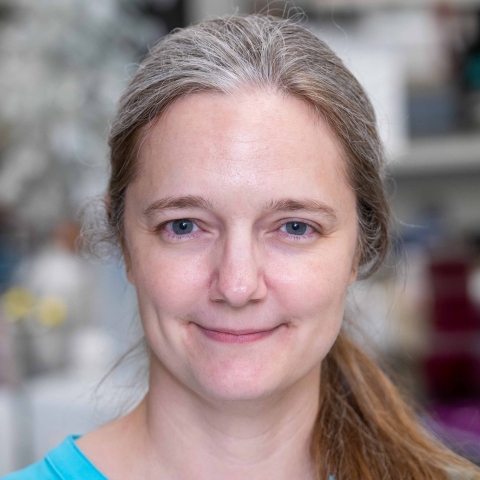
I received my Doctorate of Veterinary Medicine from Auburn University. I then completed a residency in medical oncology at North Carolina State University in 2008 and a research fellowship in the Department of Biomedical Sciences at Cornell University in 2010. I am currently an associate professor in the Department of Clinical Sciences at Cornell University. My research can be grouped into 3 broad categories: i) defining the role of DNA damage response mechanisms (DDR) in tumorigenesis and chemosensitivity as a means to identify biomarkers and therapeutic targets, ii) repurposing of drugs to find low-cost anti-cancer therapeutics, and iii) evaluating the response of normal tissues to anti-cancer therapeutics and examining the clinical progression of cancers in veterinary species.
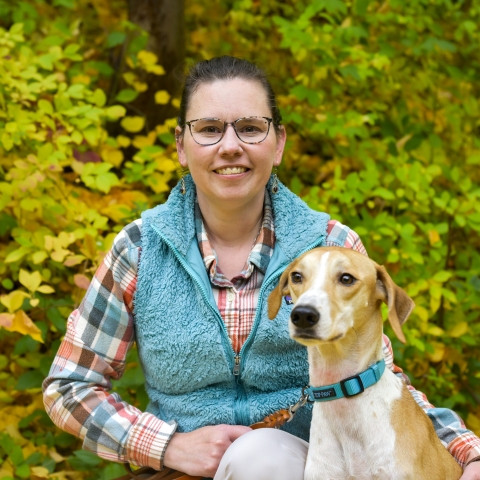
My research focuses uses modern genomic technology and bioinformatics to determine genetic variants in association with and causing phenotypes of interest and to explore population dynamics. I have a particular interest in identifying the effects of natural and artificial selection on populations and applying genomic information to improve the heath, well-being, and management of animals. I have worked across a variety of species with a main focus on dairy cattle and working dog genetics. My research commonly relies on extensive phenotyping to better understand genetic mechanisms influencing complex behavior, health, and physiological traits.

My research at The Johnson Lab is focused primarily on developing advanced neuroimaging methods in veterinary science. We apply cutting-edge magnetic resonance imaging (MRI) techniques in the evaluation of the canine brain in order to advance our knowledge of neuroanatomy and neuropathology. In doing so, we aim to improve diagnosis and understanding of brain and spinal cord disease in the dog.



I graduated from the Cornell College of Veterinary Medicine in 1992, then spend a year in a private veterinary practice in metropolitan New jersey before returning to Cornell as its first veterinary cardiology resident in 1993. I was board certified in veterinary cardiology in 1997, and completed a PhD in pharmacology here at Cornell in 2005. I was the associate director of the Cornell Feline Heath Center from 2012-2019, and have been its director since 2019.
I have been a lifelong dog and cat owner, and I feel honored to be able to help dogs, cats, and and a number of other species of animals live happy, healthy lives by diagnosing and treating their cardiovascular diseases. In addition to my work in the clinic, I am dedicated to helping owners understand and advocate for the well-being of their pets through the provision of validated information and support.

I am a Professor of Orthopedic Surgery and have worked at Cornell since 2004. My publications include multiple book chapters and peer-reviewed articles on the surgical management and treatment of orthopedic diseases, including elbow dysplasia and cranial cruciate disease.
I have dedicated my career to the investigation of surgical methods for the treatment of orthopedic disorders and the objective evaluation of their efficacy using force plate gait analysis.

I am a Professor of Comparative Ophthalmology at the Cornell University College of Veterinary Medicine and a Diplomate of the American College of Veterinary Ophthalmologists. After graduating from the University of Missouri College of Veterinary Medicine, I completed a small animal medicine and surgery internship at Texas A&M University College of Veterinary Medicine and a comparative ophthalmology residency at Cornell University, where I joined the faculty in 2006.
My research program focuses on ocular infectious diseases and non-invasive advanced in vivo imaging techniques of the eye. I have a specific interesting in canine infectious keratitis, including canine herpesvirus-1 ocular surface diseases. My research involves canine herpesvirus-1 includes investigations into host-pathogen interactions, mechanisms responsible for latent virus reactivation, and novel therapeutic strategies for ocular canine herpesvirus-1 infections.
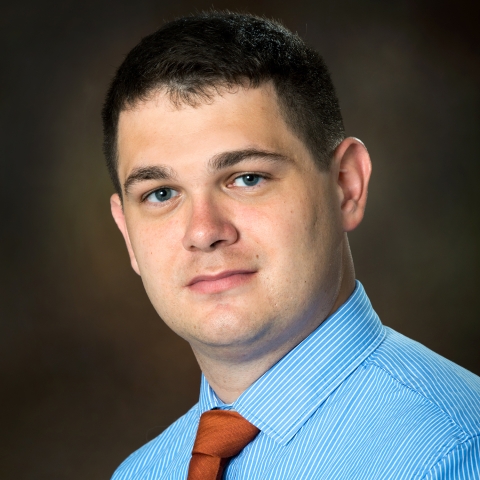
I am a small animal surgeon who currently works in both orthopedic and soft tissue surgery at the Cornell University Hospital for Animals. My research interests include evidence based medicine and the causes of orthopedic diseases.

I am an internal medicine specialist and an assistant professor in the Department of Clinical Sciences. My research is focused on improving understanding of gastrointestinal conditions affecting dogs and other species. I leverage the power of advanced molecular tools to improve diagnosis and management of canine enteropathies. The potential to determine the dysfunction underlying frustrating signs like diarrhea and poor appetite motivate me to advance knowledge of the canine gut in health and disease.

I am a medical and radiation oncologist primarily engaged in clinical radiation oncology. I have a significant administrative role that will be ending soon with increased opportunities for engagement in research.
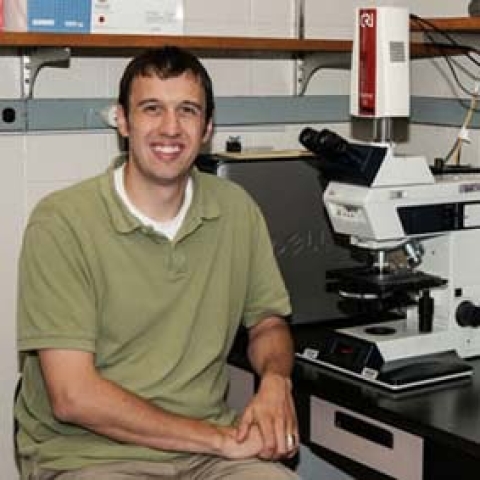
I am an associate professor in the Section of Anatomic Pathology. My research is aimed at better understanding the pathologic underpinnings of intracranial neoplasia (namely glioma and meningioma) and soft tissue sarcoma via the integration of advanced molecular studies with basic histology.
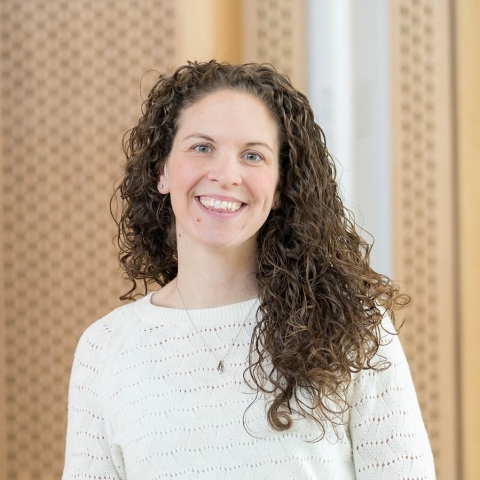
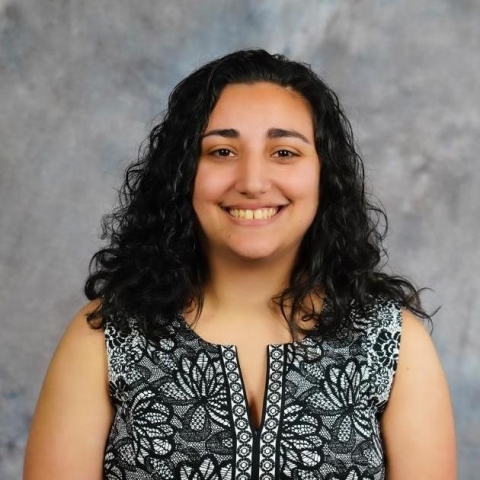
I am an assistant professor of cardiology in the Department of Clinical Sciences. After receiving both my B.S. and D.V.M. from Cornell, I completed a one-year small animal rotating internship at the Animal Medical Center, followed by a one-year cardiology research fellowship at NYU School of Medicine. I then returned to Cornell for residency in Cardiology (2017-2020), and upon completion I returned to NYU School of Medicine for a post-doctoral research fellowship (2020-2022).
My area of expertise is called cardiac electrophysiology, and I study electrical signals in the heart to learn how they can misfire and cause arrhythmias. I hope to use my research to foster a greater understanding of the normal workings of the cardiac conduction system, and the ways in which dysfunction of this system can lead to disease. My hope is for this research to influence the ways that arrhythmias are understood and ultimately treated, saving animals and people from their often-severe consequences.

I have been practicing veterinary cardiology since 2002. I received my DVM from the National School of Veterinary Medicine (ENVL) in Lyon, France. After a small animal rotating Internship, I continued as an Instructor in Emergency and Critical Care. I completed a residency in Veterinary Cardiology at Cornell in 2005. Before coming back to Cornell in 2015, I was an Associate Professor and Service Chief of Cardiology at Louisiana State University. I have also been an Associate Editor of the Journal of Veterinary Cardiology for the last 15 years. I am currently working on building a cardiac electrophysiology laboratory to diagnose and treat arrhythmia via radiofrequency catheter ablation. My research includes the development of diagnostic and therapeutic tools for the management of arrhythmias in dogs.

I am professor of virology, and I study canine viruses and immune responses to them. My lab's main areas of study include canine parvovirus and canine H3N2 and H3N8 influenza viruses.
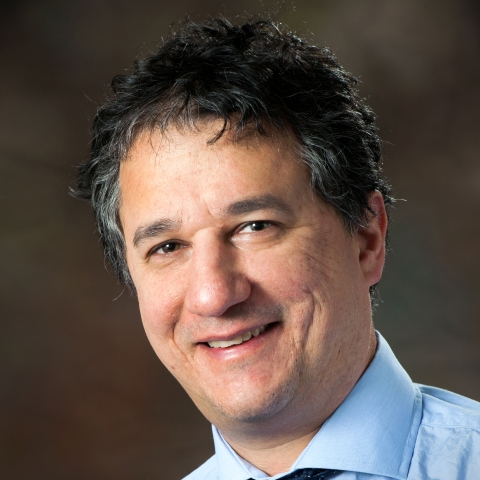
As a clinical expert in veterinary dentistry and oral surgery, I routinely diagnose and treat oral cancer in dogs. As a surgeon, I have the responsibility of helping clients make informed decisions regarding the best treatment options for their pets. Unfortunately, the treatment options currently available have remained unchanged for decades and are all associated with significant complications and side-effects. Novel rational therapies are expected to complement or replace current standards of care, but will require a deep understanding of the etiopathogenic mechanisms involved. An important part of my research focuses on understanding the molecular pathogenesis of the most common oral tumors in dogs. For this, I have established teams of investigators from different fields including molecular genetics and genomics, medical oncology, veterinary pathology, laboratory animal medicine and biochemistry. Our goal is to generate knowledge that can ultimately be translated to clinical practice.
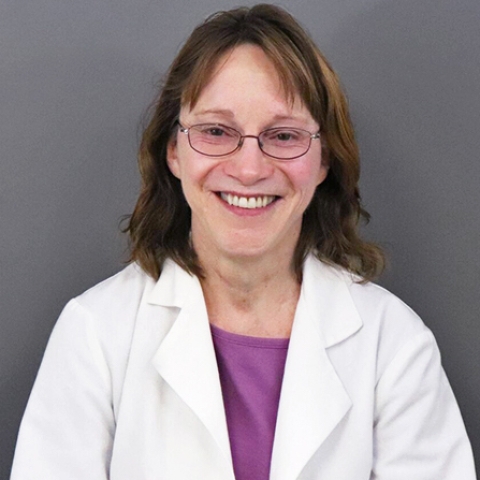

I am the director of the AHDC Diagnostic Endocrinology Laboratory, and the Endo Lab was the first lab to perform canine testing for anti-Müllerian hormone (AMH) to distinguish between spayed and intact females, and this was later expanded to test for ovarian remnant syndrome (ORS). The AMH assay is also used to test for cryptorchidism and testicular remnants. Anti-Müllerian hormone is commonly used in human medicine to estimate the size of the ovarian reserve of oocytes and to titrate the dose of gonadotropins as part ovarian stimulation protocols in the context of assisted reproduction technologies (ARTs). As the uses of ARTs in dogs advance, AMH testing has the potential to serve the same roles in dogs as it does in women. Seeing as Cornell University is currently a leader in the field of canine AMH testing for ORS and cryptorchidism, I would like the Endo Lab to be positioned to be the leader in the field of AMH testing in the context of canine ARTs, and being affiliated with the Canine Health Center will be mutually beneficial in this regard.
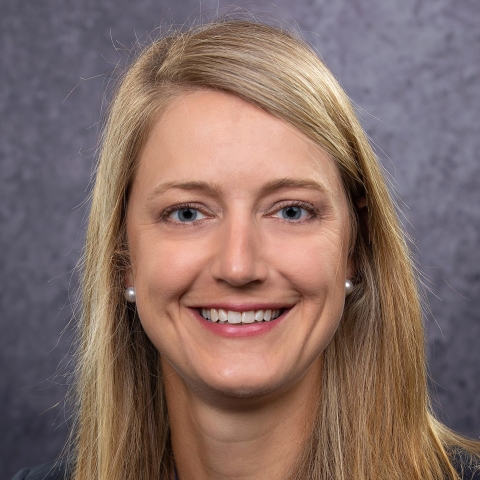
I'm currently an associate professor of large animal surgery in the Department of Clinical Sciences, and I first came to Cornell in 2008 for a large animal surgery residency. Afterwards, I worked part-time as an emergency surgeon while completing my Ph.D. in comparative biomedical sciences.
My research focuses on pathophysiology, epidemiology and the treatment of orthopedic diseases. I am especially interested in translational orthopedics across multiple species — including dogs, horses and humans. Some of my lab's recent work has focused on cranial cruciate ligament ruptures and osteoarthritic changes. By better understanding these kinds of diseases and injuries, we will ultimately improve our ability to assess individuals' risk and to develop more effective therapeutics.

My lab is interested in broad spectrum antivirals, which can be used to treat a number of viral canine infections. (For example, canine herpesvirus and canine influenza, or less likely, canine distemper or canine parvovirus — against which we have excellent vaccines).
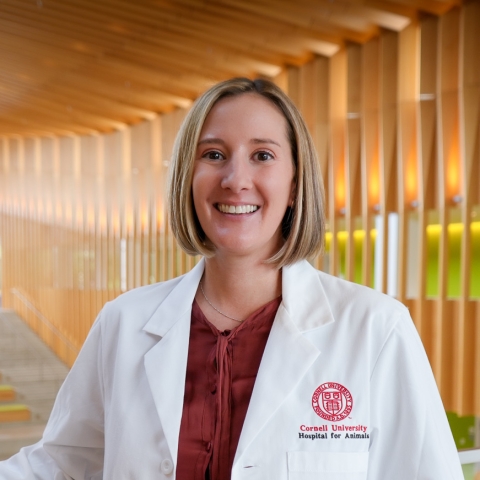
I am a veterinary ophthalmologist and an associate professor in the Department of Clinical Sciences. As a veterinary ophthalmologist, my professional interests are broadened by the wide variety of clinically relevant ocular conditions encountered in our patients. This includes advancements in the treatment of cataracts and glaucoma, comparative ocular pathology, and the ocular surface microbiome in health and disease.
Little is known about the ocular surface microbiome and its impact on disease. My work is the first in our field to investigate the temporal stability of the ocular surface microbiome before and after topical antibiotic administration in cats, dogs and horses.
By linking the clinical features of disease with their associated microbial community and pathologic changes, I provide a unique perspective in the interpretation and understanding of ocular disease processes in veterinary patients and their relevance to comparable human disorders.
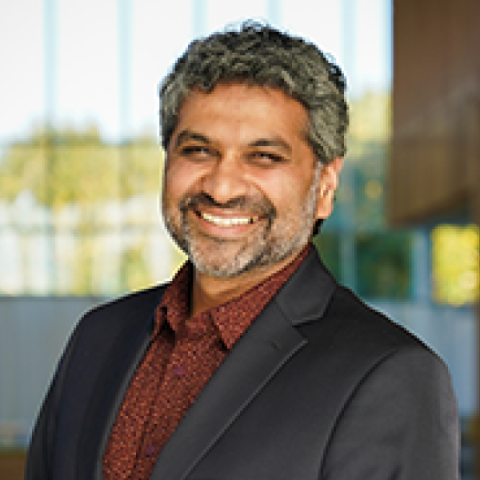
Praveen is Chair of Biomedical Sciences, Professor of Physiological Genomics, and Director of the Center for Vertebrate Genomics at Cornell University, where he leads a research lab focused on genomic approaches to understand physiology and human disease. He received his BA degree from Cornell University and his PhD in Genomics from the University of Pennsylvania. After completing a post-doctoral fellowship at the National Human Genome Research Institute under the mentorship of NIH Director Dr. Francis Collins, he moved in 2011 to the University of North Carolina at Chapel Hill as an Assistant Professor in the Department of Genetics. The same year he was selected by Genome Technology as one of the nation’s top 25 rising young investigators in genomics. In 2017, he returned to Cornell University as an Associate Professor. Praveen has authored over 140 peer-reviewed publications in scientific journals such as PNAS, Cell and Science and has served as a reviewer for over 50 different journals. Honors include a faculty merit award for outstanding teaching and mentoring, the prestigious American Diabetes Association Pathway To Stop Diabetes Research Accelerator (which is awarded to only three people per year), and the inaugural Boehringer Ingelheim Award for Excellence in Summer Research Mentorship. Praveen is also dedicated to improving science communication and has served on the advisory board for the AAAS Dialogue on Science, Ethics, and Religion. Praveen’s laboratory is located on the 7th floor of the Research Tower on Tower Road.
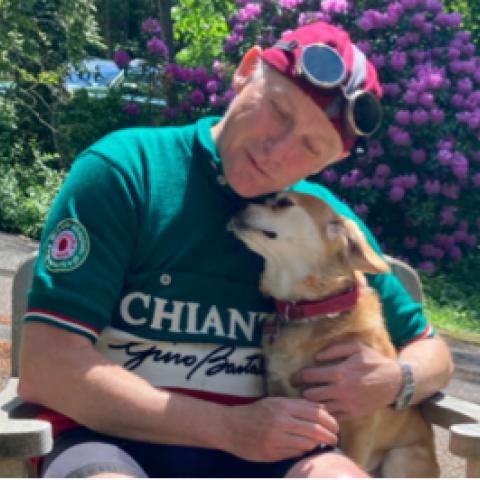


I am interested in preserving threatened and endangered wild canid species both through our studies of assisted reproduction, and through work in developing nations that conserves wildlife by sustainably overcoming poverty and hunger. The same technologies of assisted reproduction can be used to help prevent genetic disease in domestic dog breeds.

My research focuses on new avenues towards therapeutic intervention by better understanding the pathogenesis of diseases important to veterinary and human medicine. Stem cell biology and viral pathogenesis are the 2 main focus areas in the lab.


I'm a molecular biologist who investigates genomic instability and metabolic dysfunction in cancer. We use a comparative approach to study fundamental mechanisms of relevance to both human and canine malignancies, and have interests in translating our basic discoveries to improve clinical outcomes.

My research focuses on the structure and function of viral envelope proteins — how genomic mutations lead to changes in the envelope proteins and control viral pathogenesis in influenza viruses and coronaviruses, including SARS-CoV-1 and 2, MERS-CoV and feline coronaviruses. This work supports novel vaccines, therapeutics and diagnostic test development.
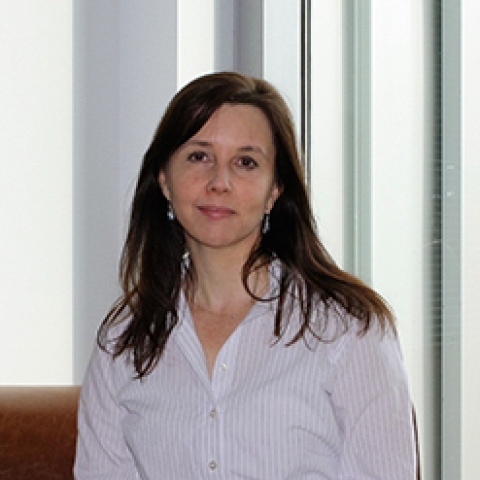
I am the associate dean of international programs at the College of Veterinary Medicine and also an associate professor of practice in the Department of Public and Ecosystem Health. Before joining Cornell, I worked as a clinical veterinarian for more than 10 years before transitioning my career toward research and academia. With my background in public health, I also spent three years working as the epidemiology and clinical training lead for the Cooperative Biological Engagement Program in Azerbaijan, as part of the U.S. Department of Defense.
My current research interests include the surveillance of infectious diseases, the epidemiology of zoonotic and vector-borne diseases, and international capacity building.
Staff
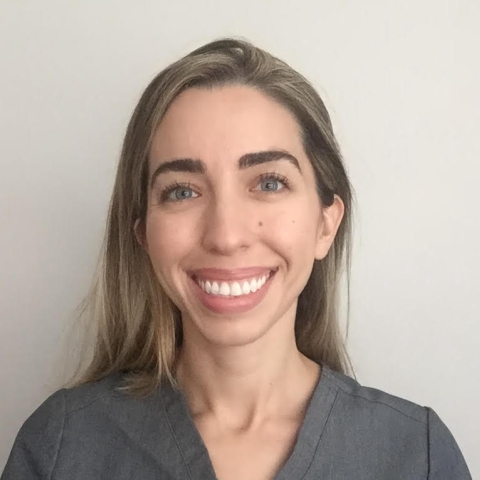
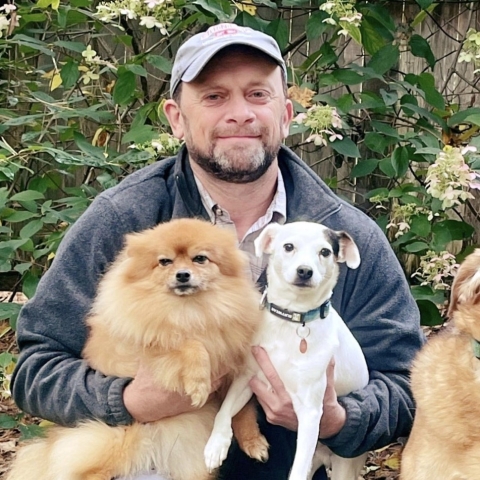

Assistant to the Director

Operations Coordinator
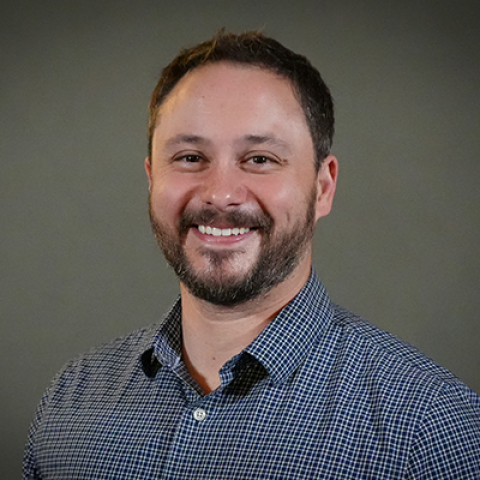
John Enright has served as a digital marketing specialist for the Baker Institute for Animal Health, the Cornell Richard P. Riney Canine Health Center and the Cornell Feline Health Center since 2022. His responsibilities include photography, videography, creation of printed materials, display items, graphic design and website management.
Enright previously worked in the Cornell University athletics department as assistant director of athletic communications. He assisted in the department’s multimedia efforts and aided in the execution of on-site productions for Cornell on the ESPN family of networks.
Prior to Cornell, Enright was a multimedia specialist for Ithaca College. He helped create video and audio content for Ithaca's 27 varsity teams, including interviews, web streaming, highlights and specialized material focusing on coaches, athletes and facilities. Enright also served as an adjunct professor in the Roy H. Park School of Communications.
Enright is a 2009 graduate of East Stroudsburg University. He obtained his master's degree from West Virginia University in 2011, and earned a certificate in digital marketing from the Cornell SC Johnson College of Business in 2019.
A native of Garnet Valley, Pa., Enright currently resides in Freeville, N.Y. with his wife, Michelle, and Boston Terrier, Louie.
Digital Marketing Specialist

Heather A. Hughes is an accomplished communications professional with extensive experience in strategic marketing, public relations, and community engagement. Currently serving as the Assistant Director for Communications & Marketing at Cornell University's Animal Health Centers, Heather leads the development and execution of multi-channel marketing strategies, collaborating with faculty and staff to enhance the visibility of the centers. Her previous roles include Director of Sales and Marketing at the Ithaca/Tompkins County Convention & Visitors Bureau and Director of Community Relations & Development at Racker, where she successfully led rebranding initiatives and fundraising efforts. Heather holds a Bachelor of Science in Travel and Tourism Administration from Niagara University, bringing a strong foundation in hospitality management to her diverse career.
Her animal family members include two labradors, Macy, a Cornell College of Veterinary Medicine blood donor, and Winston, their Morkie, Milly, and a variety of chickens.
Assistant Director for Communications & Marketing
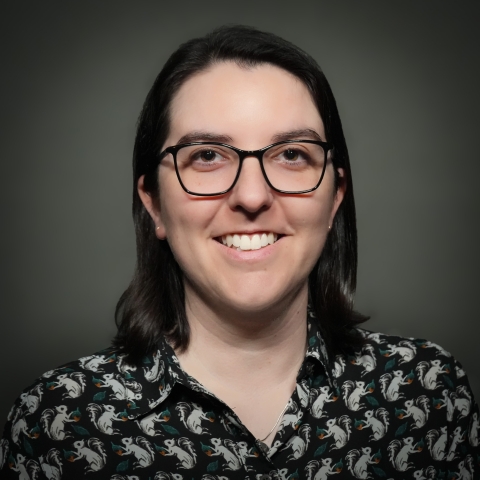
Junelle King joined the marketing and communications team supporting the work of the Animal Health Centers to assist in strengthening and bringing greater visibility to the Baker Institute for Animal Health, the Cornell Feline Health Center and the Cornell Richard P. Riney Canine Health Center through social media campaigns and content creation. Junelle also aids in the development of timely and accurate content for the Animal Health Center’s websites, longer form content creation, collaborating on multi-media projects and assisting in management of digital assets.
Before joining the team in 2024, King worked in veterinary medicine at Cornell University Hospital for Animals since 2018. As a licensed veterinarian technician (LVT), she worked in both small and large animal anesthesia, radiation oncology and medical oncology.
In her free time, King enjoys going for walks with my rescue dog, Xena, as well as gardening, birdwatching and crocheting.
Marketing and Social Media Specialist
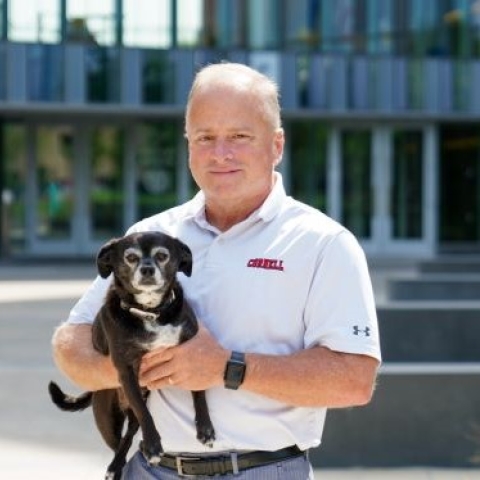
Dr. David Lee has joined the CVM leadership as faculty and associate dean for external programs. Dr. Lee will provide oversight of the Center for Veterinary Business and Entrepreneurship (CVBE) and in the continued development of the Canine Health Center. He will also contribute to teaching and expanding the CVBE’s course offerings for veterinary students, other degree programs and for external audiences.
Most recently, Dr. Lee comes from the University of Minnesota College of Veterinary Medicine, where he had served as hospital director of one of the nation’s largest veterinary teaching hospitals since 2006. He held a faculty position as associate professor of veterinary practice management and served as director of career development. In 2018, Dr. Lee was inducted into the UMN Academic Health Center’s Academy for Excellence for Health Care Practice for the successful design and implementation of pet wellness plans in a teaching hospital setting. At Minnesota, Dr. Lee also served as interim chair of their Department of Veterinary Clinical Sciences. From 2003 to 2006, Dr. Lee served as hospital director at Colorado State University.
Dr. Lee received his B.S. degree in animal science (’88) and his D.V.M. (’94) from Cornell University. He was a small animal general practitioner in Portland, ME before returning to Cornell as an instructor and extension veterinary for the college’s endocrinology laboratory. He received his MBA degree from the Johnson School in 1999 and stayed on at the CVM as director of external relations and marketing until 2003.
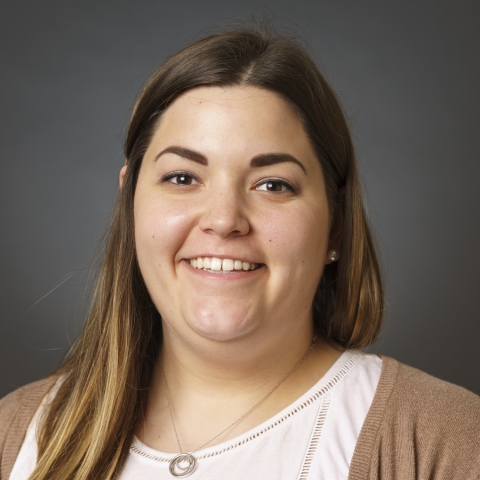
Ashley McLean is an event coordinator at the Richard P. Riney Canine Health Center and the Cornell Feline Health Center, where she plans events that support the centers' missions of advancing animal well-being through research, education, and outreach. Her work helps create meaningful experiences that connect communities to the centers' goals.
Before this role, Ashley was part of the student activities and special events team at Cornell University’s Johnson Graduate School of Business. There, she organized a variety of events that fostered community and enhanced the student experience.
Ashley holds a degree in Recreation, Parks, and Leisure Studies from SUNY Cortland, where she focused on program and conference planning. This foundation has equipped her with the skills to manage successful events in both the nonprofit and academic sectors.
Originally from the Finger Lakes region of upstate New York, Ashley enjoys spending time outdoors with her two golden retrievers, Gus and Indie. They bring plenty of joy and adventure to her life outside of work.
Events Coordinator
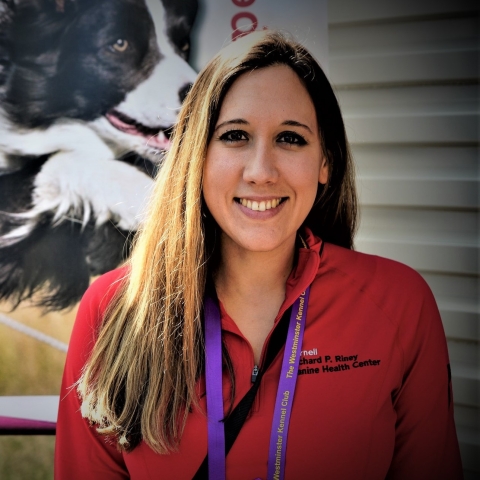
Programs & Operations Lead for External Programs

Associate Director for Finance and Administration
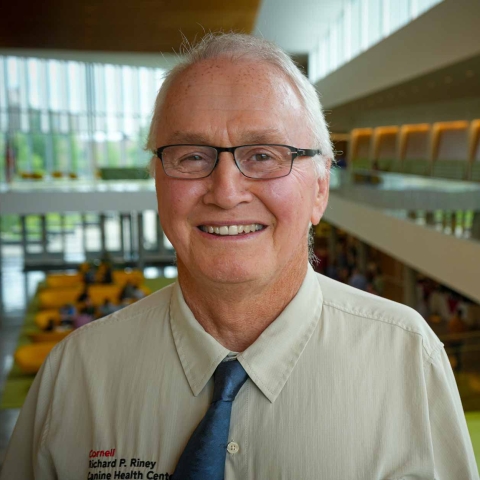
Meet our Director
As a translational orthopedic researcher who practices small animal orthopedic surgery, my main research interest has been in genetics and complex trait mapping. My research has relied at a fundamental level on leveraging natural inherited disease in our veterinary clinical population to discover the genetic factors predisposing to complex trait inheritance. The Cornell Veterinary Biobank is the first biobank to achieve accreditation by the International Standards Organization (ISO 203807). I am convinced that properly processed and archived biological samples, with a clear chain of attribution, are critical to valid preclinical and basic research. Using these samples, I am interested in reducing the severity of complex orthopedic traits in dogs especially hip dysplasia, elbow dysplasia, rupture of the cranial cruciate ligament (ACL in humans), and Legg Calve Perthes disease using genetic and genomic tools. The goal is to develop a tool kit of genetic strategies to identify breeding dogs with good orthopedic genetic quality to predict and prevent and introduce novel therapies for orthopedic disease. As a surgeon, I am concerned about surgically-related orthopedic infection in dogs and how to better surveil these infections in our teaching hospital to reduce and prevent them using epidemiological, genomic and metabolomic tools.

Membership Coordinator


